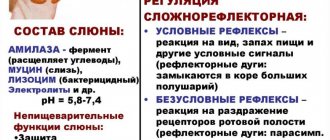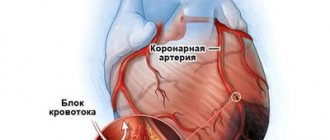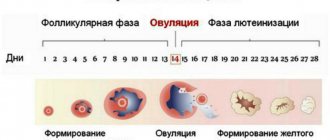Many mothers complain of bouts of crying and restless behavior in their babies after 2-3 weeks of life.
The baby slept and ate for two weeks, and everything seemed to be fine, and suddenly after the third week, cries that are incomprehensible to the parents appear, which cannot always be solved by feeding or rocking. Everyone around me immediately says that it’s “my tummy hurts,” “gas pains me,” “colic, it will go away by 3 months.” Parents, trying to help their baby, follow countless pieces of advice and use medications, but they often notice that no matter what they do, it doesn’t help much. In this article we will try to explain the main and most common reasons for babies crying, we will suggest ways that will help alleviate the baby’s condition and improve the overall atmosphere in the family. Let's divide these reasons into two large groups: conditions that are associated with pain in the tummy, and other conditions that are not related to the stomach or digestion, but are still uncomfortable for the baby.
When your tummy hurts
Babies are born with sterile intestines. As they grow, eat, and interact with their environment, their gut becomes colonized with microorganisms. Microorganisms form microflora, which then ensures normal digestion of food. While the microflora is developing, babies' digestion may have temporary disruptions; sometimes the color and consistency of stool may change, and sometimes the baby produces more gas than usual. All this is within normal limits and usually does not cause much concern for the child.
What features of digestion can still bother a baby?
Below we will look at the main reasons that can cause increased gas formation in a baby.
Features of sleep for babies from 0 to 3 months
Some manifestations of restless behavior in children after falling asleep can be explained by the peculiarities of the structure of their sleep.
A baby's sleep, like an adult's, consists of two phases:
- Orthodox or slow-wave sleep. During this period, the brain is inactive, the body is relaxed, breathing is even and calm. It is during slow-wave sleep that a person fully rests and restores physical strength.
- Paradoxical or REM sleep. The paradoxical phase is characterized by an increase in body temperature and pressure, rapid heartbeat, breathing, and rapid movement of the eyeballs under closed eyelids.
During sleep, both phases replace each other: first comes slow sleep, then fast sleep, and so on in a circle. The structure of sleep in infants in the first months of life is unique: its main part is REM sleep, during which the baby may grimace, twitch his arms and legs. This behavior of a baby during sleep is absolutely normal and should not bother parents. As the child grows older, the period of the orthodox phase gradually increases, and the child begins to sleep more peacefully.
Lactase deficiency
A condition in which a child either has insufficient production of the enzyme lactase by intestinal cells, or he receives too much lactose carbohydrate with milk, which he is not able to digest completely.
Symptoms : Green, foamy stools, loose stools (diarrhea), rumbling in the stomach, slow or no weight gain, possibly a rash. Often, with lactase deficiency, the child burps profusely. What to do : first of all, you need to pay attention to the attachment to the breast and the frequency of changing breasts during feeding, most often these two factors aggravate problems with the digestion of lactose. Consultation with a pediatrician or gastroenterologist is also necessary. More information about lactase deficiency can be found in our article.
Allergy to cow's milk protein (CMP)
One of the most common allergens in children under 2 years of age is cow's milk protein.
Symptoms : The stool may be foamy, the color is closer to green, and there may be streaks of blood in the stool. Sometimes there is an obvious allergic rash, but there may not be one. A clear symptom of an allergy to CMP: the child begins to suckle at the breast, then drops it crying, this is repeated several times until he is half asleep. It is clearly visible that the child is suffering from this. It is important to distinguish this refusal to suckle further from other types of breast refusal. Allergy to CMP is often accompanied by changes in stool.
Important! An allergy to CMP can manifest itself at any age, even if a nursing mother ate dairy products for two months and everything was fine, and in the third month the child began to show such a reaction.
What to do : If you suspect an allergy to CMP, it is recommended to completely remove dairy and fermented milk products from your diet for at least a week or ten days. This may also apply to Maria cookies, which are so often recommended as hypoallergenic, but many manufacturers use milk powder in making cookies. If there is no effect this week, then you can try to return milk to the diet. If the effect of the absence of dairy products is noticeable (the child began to worry less at the breast, cry less, bowel movements have improved), then it makes sense to reintroduce the allergen into the mother’s diet no earlier than after a month, and only gradually.
Reaction to other foods in the mother's diet
There is a widespread belief that the diet of a nursing mother can affect increased gas formation in the child’s intestines: the mother ate something wrong, and the child has a stomach ache. They say that the child's stomach is seething, it is swollen, and the baby is swelling.
Indeed, there may be foods in your diet to which your child may have an individual reaction. But recommendations for all nursing mothers to exclude from their diet, for example, raw vegetables (cabbage, cucumbers, tomatoes), as they allegedly provoke the appearance of gas, are not justified. You should try any product and see the child’s reaction, and not refuse it “just in case.” In our articles you can learn more about the nutrition of a nursing mother and the child’s food reactions.
The main causes of restless sleep in infants
Frequent awakenings of babies, difficulties with subsequent falling asleep, crying and screaming in their sleep can be associated with the following reasons:
- hunger;
- intestinal colic;
- excess of emotions;
- uncomfortable sleeping conditions;
- poor sleep hygiene;
- somatic diseases;
- increased intracranial pressure.
Online consultation with a pediatrician
Online consultation
During the consultation, you will be able to voice your problem, the doctor will clarify the situation, interpret the tests, answer your questions and give the necessary recommendations.
Hunger
Hunger is the main cause of restless sleep in babies from 0 to 3 months. Breastfed babies wake up every 1-3 hours to feed. Formula-fed babies eat less often (every 2-5 hours) because the gastrointestinal tract takes longer to digest the formula.
Mothers of breastfed babies have the choice of feeding their babies on demand or by the hour. The WHO recommends choosing the first option, which not only meets the child's nutritional needs, but also promotes calm behavior. When feeding on demand, mothers should not be afraid of overfeeding their babies: they will never eat more than they need.
It happens that a child often wakes up and asks for the breast due to a woman’s lack of milk. In such a situation, the baby, in addition to restless sleep, will experience insufficient weight gain, a decrease in the number of urinations, and dry skin.
Intestinal colic
Intestinal colic in infants is sudden, paroxysmal pain in the abdomen. Children with colic are restless, eat poorly, spit up a lot, often knock their legs, sometimes throw their heads back and arch.
The exact cause of colic in babies is unknown. There are several theories about the origin of paroxysmal pain. One of them is the immaturity of the gastrointestinal tract. Imperfect motor function of the digestive tract leads to increased gas formation in the intestines, which causes pain.
As a rule, colic is a physiological norm and goes away on its own by 3 months of age. Therefore, parents should be patient and calmly treat this child’s condition.
What can help a baby with colic?
- Mother's diet if the child is breastfed. It is worth removing from your diet foods that increase gas formation: sweets, legumes, vegetables with coarse dietary fiber (cabbage, radish, radish), carbonated drinks.
- Selection of an adequate formula if the baby is bottle-fed.
- Correct baby position during and after feeding. During feeding, it is important to avoid the baby from swallowing air. To do this, make sure that when feeding the baby does not rest his sweaty nose on the areola, and he maintains normal nasal breathing. After feeding, the baby should be held in a “column” position.
Herbal medicines and probiotics are also used to relieve colic. However, such treatment can only be used after consultation with a pediatrician.
Excess of emotions
In the first three months of life, babies' hearing and vision quickly develop. Thanks to this, they actively get acquainted with the world around them and receive a lot of emotions and impressions. And if a newborn perceives only loud sounds, then by the age of 2 months the baby begins to hear low and quiet tones, learns to compare what he hears with what he sees, and tries to connect auditory and sound impressions together.
During sleep, the child's brain carefully processes and analyzes all the impressions he received while awake. Therefore, an excess of emotions can negatively affect children's sleep. Too loud music before bedtime, large crowds of people - all this affects the quality of rest. Eliminating such factors will help avoid an excess of emotions in the child.
Uncomfortable sleeping conditions
Uncomfortable conditions can also cause your baby to have restless sleep. The optimal conditions for children's recreation are:
- Air temperature 20–22 °C. At higher levels, the child may feel stuffy and hot. You should not wrap your baby up or put extra clothes on him “just in case.”
- Air humidity 40–60%. Dry air in the room leads to dry mucous membranes, difficulty breathing through the nose, and thirst.
- Dim lighting during the day and no lighting at night. Bright lighting is a irritant that affects sleep. During daytime sleep, you should not create complete darkness: this can lead to the child confusing day with night.
- Clothes made from natural fabrics, without tight elastic bands.
- Dry diaper. Slips - comfortable and practical clothing for babies - allow you to quickly change a diaper during sleep.
Poor sleep hygiene
Well, what mother would refuse to carry her baby in her arms and rock her when he is capricious and does not go to bed? Meanwhile, such manipulations before bedtime will eventually lead to the fact that the child will not be able to fall asleep on his own.
Of course, you should not impose strict discipline on your child’s behavior before bedtime. It is not at all necessary to leave the baby alone in the crib. You can just be nearby. Do not carry in your arms, but hug. Don't rock him, but pat him on the head. In essence, this is the replenishment of the same missing contact with the mother.
Somatic diseases
Somatic diseases include disorders caused by external influences or malfunction of internal organs. But at the same time they are in no way connected with the human psyche. The most common somatic disorders in infants are runny nose and dermatitis.
In the first case, difficult nasal breathing interferes with the child’s proper sleep. With dermatitis, the child’s body becomes covered with inflamed areas that itch and cause severe discomfort. Competent treatment prescribed by a pediatrician will allow you to cope with such diseases.
Increased intracranial pressure
The functioning of the brain and spinal cord is impossible without regular circulation of cerebrospinal fluid - a biological fluid consisting of water, amino acids, enzymes, and trace elements. Normal circulation of cerebrospinal fluid provides the cells of the brain and spinal cord with necessary nutrients, removes metabolic products, and neutralizes short-term changes in blood composition. Any deviation in the cerebrospinal fluid circulation system leads to excessive accumulation of biological fluid in the cavities of the brain and an increase in intracranial pressure.
High intracranial pressure in infants is manifested not only by sleep disturbances, but also by other signs:
- increase in head size;
- constant regurgitation;
- decreased appetite;
- increased nervousness.
In order to identify and eliminate the disorder, it is necessary to do neurosonography (ultrasound of the brain with Doppler) and contact a neurologist.
Dysbacteriosis
Pediatricians often recommend that parents test their child's stool for dysbacteriosis, meaning it is a common cause of "gas" that torments the baby. It is necessary to understand that during the period of formation of microflora, a child will definitely have dysbiosis to one degree or another, since in a newborn child the microflora is constantly changing and the balance of microorganisms is established only closer to 3-4 months. But you can pay attention to the strong excess of the concentration level of such microorganisms as Klebsiella spp, Staffilococus aureus, E. Coli hemolytica, which often cause severe discomfort to the baby.
Treatment of mother or child with antibiotics increases the risk of severe dysbiosis, so you should definitely discuss therapy with your pediatrician to maintain the baby’s intestinal microflora.
Symptoms : loose stools, maybe foamy, green, mucus. With a staphylococcal infection, there may be a pinpoint rash. What to do : Contact your pediatrician for an examination and treatment plan if necessary.
As you noticed, the manifestations of lactase deficiency, allergies and dysbacteriosis are very similar. And often these conditions can be together. Since intestinal cells are damaged during allergies, less lactase may be produced. And with a strong degree of dysbiosis, the intestines may be more sensitive to allergens. Therefore, if a child has a persistent described change in stool, bloating and obvious anxiety, then all these conditions should be excluded.
And the last reason for crying related to the “tummy”:
Difficult infant bowel movement
Symptoms : The child may, at any time or in between, suddenly begin to cry, pull his arms and legs towards his body, strain his stomach, and push hard. Then he releases gas or walks around, and calms down almost immediately or within a minute.
This phenomenon is called dyschezia or infantile obstructed defecation. It is connected with the fact that the child feels discomfort, fullness in the intestines, but he cannot, like an adult, direct all the force of pushing to a certain place; he has to strain with his whole body, sometimes adding screaming, in order to finally push out the excess. It happens that it doesn’t work out the first time. Sometimes parents cannot bear to see the torment and actively help the child with a gas tube, thus speeding up the process. It is often said about children at this age that they “don’t poop themselves.”
What to do:
- Calm yourself and calm your child. You need to realize that nothing terrible is happening to him, that if the cry is accompanied by active straining, then the child is simply trying to help himself.
- You can give your baby the breast; as soon as he starts sucking, he will relax, and most likely the process will go easier. You can soothe with white noise (hair dryer, sound of water).
- You can press your knees towards your tummy to relax the muscles of the anterior abdominal wall.
- Sometimes vertical swinging on a fitball helps, which also has a calming effect on the child.
It’s okay if sometimes you helped your child cope with this with a gas outlet tube. The main thing is not to do this many times every day, as this interferes with the formation of the skill of independent defecation, which the child really needs. He will successfully master it in about three months.
If you are faced with the fact that your child is worried about increased gas formation, do not rush to resort to “remedies for eliminating gas” (dill water, Bobotik, Sub Simplex, Espumisan). According to studies, the effectiveness of these drugs is no more effective than placebo . It is important to contact a specialist (pediatrician, gastroenterologist) who will help find the cause of the problem, and not fight its consequences.
If all of the above reasons are excluded, and crying attacks are not associated with the activity of the gastrointestinal tract, the diet does not have an effect, then your child…
True infant colic
Symptoms : The child was calm and cheerful, but suddenly begins to cry inconsolably, scream, and press his legs to his stomach. The stomach tightens from screaming, which often leads to the idea that it is due to gas. But everyone's stomach tightens when they cry, and babies are no exception. And suddenly, after some time, the crying stops and the child is calm again. There is a phrase: “If you doubt whether your baby has colic or not, then it’s not colic.” And this is true for true colic, since they cannot be confused with anything. During an attack, the child may not respond to a change in position, to an offered breast, or to rocking. He simply becomes silent only when the attack passes.
The main criterion for diagnosing colic: “Colic is bouts of crying in a healthy child, lasting more than 3 hours in a row, more than 3 days a week, any of the last 3 weeks” [ii].
Often true colic is characterized by the traffic light rule: when the car is moving, the child is sleeping, as soon as it stops at a red light, the child begins to cry.
Causes: The modern view of the cause of colic states that this condition is not associated with damage to the gastrointestinal tract itself, but is a consequence of the child’s increased sensitivity to the processes occurring inside him. It is believed that this is a manifestation of infantile migraine.[iii] It is important to understand that this is not a disease.
If outside the attack the child is calm, gains weight normally and has a good appetite, then these crying attacks do not affect his general condition. But despite the fact that they do not affect the baby’s health, colic leads to a decrease in the quality of life of the entire family as a whole and has a very exhausting effect on the mother, since most often in the postpartum state she looks for the cause of any anxiety in the child in herself and in mother’s milk.
What to do:
What sometimes helps in the case of true colic: vertical swing on a fitball, “white” noise, skin-to-skin contact, a sudden change of environment (blow on the child, go outside).
True colic is not as common as it seems at first glance. This is a difficult period, usually from 3 weeks to 2.5 months, then the hysterics gradually fade away.
It is important for a mother to accept the fact that her child is very sensitive, and she can help him through this period with care and love.
In general, the period from 3 weeks to 3 months is very restless for the vast majority of babies. This is not always associated with colic, tummy, or stool. Children may cry from fatigue, overexcitation, discomfort, or lack of contact with an adult. It is characteristic that this begins at three weeks, since it is believed that in the first weeks after birth, babies sleep. Then they begin to be more awake and discover that there is a world around them, and mothers now exist separately, and children become more demanding of sleep and contact with parents.
How long should a baby sleep?
The importance of sleep for a baby is difficult to overestimate.
Quality rest, as well as good nutrition, is the key to normal physical and psycho-emotional health of children. During sleep:
- the hormone somatotropin is produced, which plays an important role in the formation of the skeleton;
- Immunity is restored. After falling asleep, T-lymphocytes are activated, destroying viruses and bacteria;
- metabolism in tissues increases;
- cells are renewed;
- the nervous system relaxes.
Babies spend most of their time sleeping during the first three months of life. According to WHO recommendations, the total sleep duration of babies from 0 to 3 months should be 14–17 hours a day. However, these indicators are approximate, because each child is individual. Therefore, if your baby sleeps more or less than the established norm, but still feels good, then there is no need to worry.
How to make this period easier for the baby and his loved ones?
There are quite simple techniques that can help either reduce or prevent crying attacks. Below are the main ones.
Satisfying basic needs:
- Tactile contact: if the child cries, the first thing you do is pick him up. If that calmed him down, then he needed to know you were there.
- Feeding: If your baby continues to be fussy, offer the breast, even if he has eaten recently.
- Comfort: If close contact and feeding do not help, you need to find out if the baby is experiencing discomfort from the diaper, clothing or ambient temperature.
Frequent tactile contact and carrying of the child:
- Carrying in your arms or in a sling: when the baby is regularly close to his mother, he does not need to cry again to call her. The constant feeling of parental warmth makes babies noticeably calmer.
- Massage: A gentle circular tummy massage or back massage relaxes the baby.
- “Anti-colic position”: you can place the baby’s tummy on the inner surface of your forearm, with your legs towards your elbow, your head and chest should be placed on your hand or supported with your other hand. In this position, the tummy is gently massaged, since the legs are bent and spread apart, making it easier for the child to release gas. A slight swing or walk in this position relaxes the baby well.
- Skin-to-skin contact: Undress your baby and place him on your stomach.
Reduce irritation:
- Swaddle the baby;
- Dim the lights and remove harsh sounds;
- Turn on white noise.









